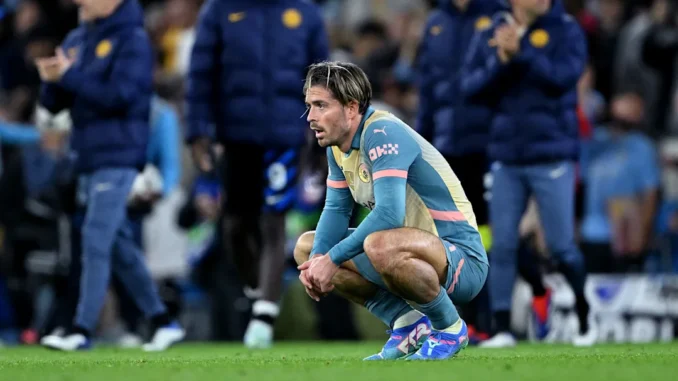
Jack Grealish, one of Manchester City’s most high-profile players, has found himself in an unwelcome spotlight after setting an unwanted record during the 2024 season. Despite his undeniable talent and moments of brilliance on the pitch, this record highlights the challenges Grealish has faced in maintaining consistency within one of the world’s most competitive football teams. For a player of his caliber and reputation, it’s a stark reminder of the fine margins that exist at the elite level of the sport.
The record in question revolves around Grealish becoming the Manchester City player with the longest drought of direct goal contributions—goals and assists—during a single Premier League campaign since joining the club. While his performances often show flashes of creativity and flair, his inability to deliver tangible results in key moments has drawn criticism from fans and pundits alike. This statistic is particularly surprising given Grealish’s pivotal role in Pep Guardiola’s system, where every player is expected to contribute both offensively and defensively.
For Grealish, the 2024 season has been one of ups and downs. On one hand, he has continued to be a regular presence in Guardiola’s starting lineup, showcasing his versatility by adapting to various roles on the left flank and occasionally operating as a central playmaker. His work rate and ability to retain possession under pressure have remained strengths, making him an essential cog in City’s intricate build-up play. However, his lack of end product—goals and assists—has overshadowed these contributions, leaving many to question whether he is meeting the expectations that come with his hefty price tag.
Grealish’s record-breaking drought has not gone unnoticed, especially in a team renowned for its attacking prowess. With teammates like Erling Haaland, Kevin De Bruyne, and Phil Foden delivering consistent performances, the spotlight on Grealish’s struggles has grown even brighter. Fans, who were initially captivated by his £100 million move from Aston Villa in 2021, are now beginning to voice their frustration. While his first two seasons at City saw him steadily integrate into Guardiola’s system, the 2024 campaign has exposed areas of his game that require improvement.
One of the primary criticisms leveled at Grealish is his decision-making in the final third. While he excels at drawing defenders and creating space for others, he often appears hesitant when it comes to taking risks, whether by attempting a shot or threading a decisive pass. This cautious approach has limited his impact in front of goal, a stark contrast to his prolific performances during his Aston Villa days. At Villa, Grealish was the undisputed star, shouldering the creative burden and regularly producing match-winning moments. At City, however, he has had to adapt to a system where individual brilliance takes a backseat to collective efficiency—a transition that has not been without its challenges.
Guardiola, known for his meticulous approach to player development, has publicly defended Grealish on multiple occasions. The City manager has emphasized the importance of Grealish’s contributions beyond statistics, pointing to his role in maintaining possession, breaking defensive lines, and facilitating attacking transitions. Guardiola’s trust in Grealish is evident in the minutes he continues to receive, but even the most supportive of managers will expect more tangible results from a player of his stature.
Adding to the complexity of Grealish’s situation is the intense competition for places within the Manchester City squad. With rising stars like Cole Palmer and established players like Bernardo Silva vying for similar positions, Grealish cannot afford to rest on his laurels. Every match presents an opportunity for others to stake their claim, increasing the pressure on Grealish to deliver. His continued presence in the starting eleven suggests Guardiola values his contributions, but the pressure to justify his selection is mounting with each goalless appearance.
Off the pitch, Grealish has maintained a positive attitude, often expressing his gratitude for the support he receives from fans and teammates. In interviews, he has acknowledged the areas where he needs to improve and has vowed to work harder to regain his form. “I know I haven’t been at my best this season,” Grealish admitted in a recent post-match interview. “But I’m focused on getting back to where I need to be. This is football, and every player goes through ups and downs. It’s about how you respond.”
Despite the criticism, Grealish remains a key figure in Manchester City’s squad, and his potential to turn things around is undeniable. His technical ability, vision, and flair are assets that, when combined with greater confidence and decisiveness, could see him regain his place as one of the Premier League’s most effective attackers. With half the season still to play, there is ample time for Grealish to silence his doubters and contribute meaningfully to City’s title ambitions.
The unwanted record Grealish has set in 2024 is undoubtedly a low point in his Manchester City career, but it also represents an opportunity for growth. Many great players have faced similar challenges and emerged stronger, using setbacks as motivation to elevate their game. For Grealish, this moment could serve as a turning point, spurring him to rediscover the form that made him one of English football’s most exciting talents.
As Manchester City continues its quest for domestic and European glory, Grealish’s ability to overcome this rough patch will be crucial. The road ahead is challenging, but with the backing of Guardiola, his teammates, and his fans, Grealish has every chance to turn this narrative around. In a sport where redemption stories are celebrated, Jack Grealish has the stage set for a comeback that could redefine his legacy at Manchester City.
Leave a Reply